 |
|
  02.25.03 02.25.03
click to enlarge



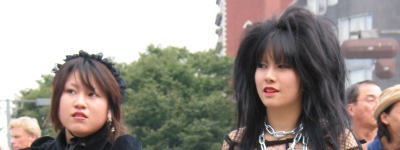

Some good news today: I won a Photobloggie award in the category of 'Best Travel Photoblog'.
Thanks to all of you who voted for Hunkabutta.
It's really nice to get some recognition.
On a related note, Hunkabutta will
be two
years old tomorrow. It really doesn't
seem
like I've been doing this for two years,
but I guess the archives don't lie.
The two-year milestone has made me
reflect
a bit on what Hunkabutta has turned
into
and what I originally intended it to
be.
It may surprise some of you to learn that
I originally made Hunkabutta to be online
for only about 3 or 4 weeks. I was the Webmaster
of an English language website on Japan called
www.mixpizza.co.jp (now offline). I wanted
to transfer within my company and become
a website programmer, but I didn't have any
previous work experience, so I created Hunkabutta
as a kind of demo/portfolio site. I envisioned
the site as being about both photography
and my life, but as it turned out, and not
too surprisingly I suppose, it evolved into
a site about Japan.
Like a lot of websites, Hunkabutta has taken
on a life of its own, and in some ways it
moves with its own momentum. This has a
lot to do with the very active comment section.
I know that I don't make many appearances
in the comments, but believe me when I say
I read them all and they make a difference.
Take today's girl pictures for instance,
I put them up as a way to throw a bone to
the Japan-o-phile wiener-pullers who complain
in the comments and via email that I don't
put up enough 'Japanese hotty' pictures.
You may also be surprised to learn that words
like 'butt', 'tight', and 'sexy' are consistently
in the top-five search words on Hunkabutta,
and that this shitty picture of a girl's ass on an escalator is by far
the most linked to and visited picture on
the site.
The masturbator contingent is of course ubiquitous
across the entire spectrum of the Internet.
However, I think that the type of visitor
that gets the most from Hunkabutta is the
expat foreigner: i.e., Non-Japanese people
who used to live in Japan but have since
moved back to their home countries. Pretty
much every other day somebody writes to me
and tells me how much my pictures remind
them of something or other when they used
to live in Japan way back when.
The other major group of Hunkabutta visitors
seems to be young people, often in university,
who are dreaming about coming to Japan. These
people want to get a taste for what things
are like here and they want to fuel their
fantasies when they get down about all of
the homework that they have to do in order
to past that mid term exam in Asian History.
The final group of visitors are my
friends
and family back in Canada. They are
really
the reason that I kept the site going,
especially
in the beginning. I'm terrible at staying
touch with people, but by having a
website
people can at least stay in touch with
me.
So thank you for visiting, whoever you are.
Whether you have your wiener in your hand,
or a textbook; whether you've lived here
in Japan before or hope to some day.
  02.22.03 02.22.03
click to enlarge








Today I took Jack to a fashion shoot. It
was held at a small studio up the coast about
two hours north of Tokyo. The studio, called
'Ios Studio', is a recreation of a Greek
island villa.
It was mind-numbing to see this white, domed
building, which looked like it came straight
out of a postcard from Crete, set in the
pine-covered sand dunes of the Japanese coast
-- kind of like seeing Zorba the Greek tilling
a rice paddy.
The building was equally impressive inside.
It was filled with antique European furniture,
and it made a pretty good attempt at that
'simple Euro country' style.
The shoot, the first one I've ever been to,
though Karen has gone to several with Jack
before, went fairly well I thought. Jack
was a super star, of course -- always Mr.
Congeniality.
Because the studio was set on the beach,
Jack and I got a chance to take a few
pictures
of some of the local people 'fishing'
with
hooped nets for giant clams that get
washed
ashore in the surf.
All in all it was a very enjoyable, though
tiring, day.
Anyhow, it's getting late here and I have
no mental energy left whatsoever, so I'm
going to cut my story short and leave you
with the pictures.
Enjoy.
  02.19.03 02.19.03
click to enlarge
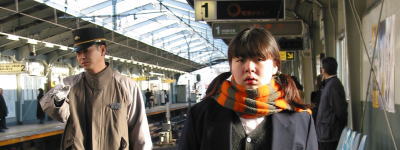
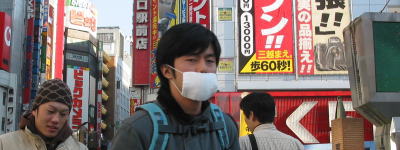

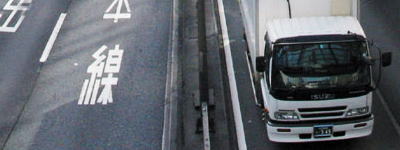
In Japan fairness is equated with equality,
and equality is equated with being identical.
Last week Karen, my wife, started working
part time at the American Chamber of Commerce
as an editor. Her contract will last a month.
Today she came home and told me about an
office argument that she overheard. The argument
was between a large, intimidating American
office manager and a Japanese office lady
with a surprising amount of guts. Karen wasn't
sure exactly what the argument was about,
some sort of office politics no doubt, but
one part that she heard stuck out in her
mind.
The Japanese office lady said something
along
the lines of, "You can't do it
that
way. You have to treat everyone the
same.
It's not fair.
The big American manger replied, "Well,
I'm not treating everyone the same, but I'm
being fair."
This little exchange highlights the discrepancies
between Western concepts of parity, which
are ideally based on 'objective', logical
standards, and Japanese concepts of parity
which are subjective and influenced by the
given social context.
I'll give you an example of what I mean,
and this is, by the way, an excellent 'clash
of cultures' anecdote.
When I first came to Japan I worked as an
assistant English teacher in several junior
high schools in Tokyo. Every semester I would
rotate between three or four different schools
and help out in every English class.
One of the things that struck me as odd was
the fact that the schools didn't stream students
according to ability (I have heard that this
is recently changing). In every subject,
all the kids, whether they were brilliant
or borderline mentally retarded (and this
mix did actually occur) were taught the exact
same thing in the exact same classroom.
In one English class that I taught there
was a boy whose mother was British. He was
basically fluent in English, but most of
the other kids were still trying to master
'Hello, my name is...', and a few of the
introverts who couldn't even manage that
sat at the back in silence and picked at
their moles.
I tried to convince this boy's teacher that
he should be taught separately, or that we
should prepare special materials for him,
but the teacher would have nothing of it.
Day after day this English-speaking boy had
to stand up with everyone else and say things
like, "This is a pen", and, "I
like baseball".
Whenever I pressed one of the teachers to
explain why we couldn't treat any of the
students differently, whether it be giving
them extra homework or kicking them out of
class for fighting, their final argument
would invariably be the same: "It's
because of human rights. In Japan, children
have human rights too."
I never could get my head around the Japanese
take on 'human rights' but I think that it
had something to do with a concept of equality,
and as I said earlier, equality is pretty
much the same as being identical. There's
a frequently translated Japanese proverb
that says, 'The nail that sticks up gets
hammered down.' Fitting in with the group
is very important in Japan.
At one point I even found myself in the surprising
situation of trying to teach English to kids
with Down's Syndrome (in a special class),
many of whom couldn't even speak Japanese,
for the sole reason that 'everyone else in
the school studies English.'
I used to get angry and frustrated by the
unwillingness of the teachers to treat any
of the students differently. However, in
retrospect I see that I was just being the
classic know-it-all foreigner. Put basically,
people from here know how things work here.
I wanted to teach the half-British boy advanced
English, but his teacher was sensitive enough
to realize that it was already amazingly
difficult for this boy to fit in with his
classmates, and if we singled him out for
special treatment we would only make things
worse. I wanted to teach the mentally handicapped
kids how to do housework and use basic social
skills, like we do in Canada, but their Japanese
teachers probably realized that the self-esteem
that they would gain by studying English
'just like everyone else' would greatly outweigh
the utilitarian benefits of more life-skills
training.
I suppose it pays to keep an open mind, even
if it is only open in retrospect.
  02.16.03 02.16.03
click to enlarge

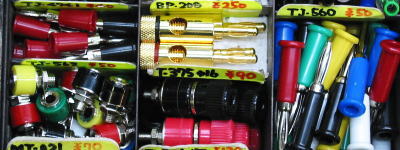
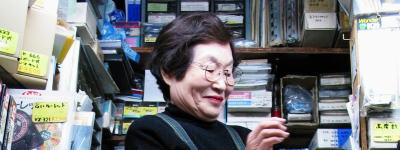
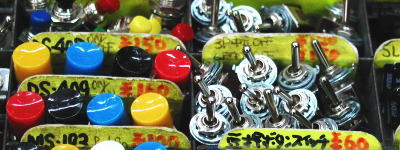
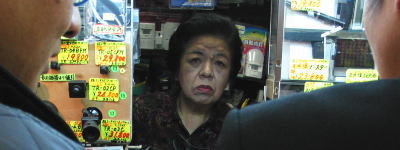


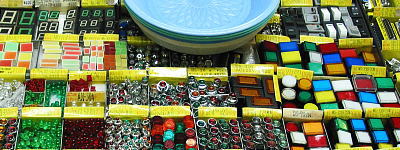
You may know that I'm currently enrolled
in a Japanese language school. My school
is very strict, and the amount of homework
that we get is indecent. Beginning this week,
a portion of our homework will consist of
exercises that we record on audio cassettes.
I don't have a cassette recorder, that's
why I decided to go down to Akihabara, the
electronics district, and search for a cheap
one. That's where today's pictures are from.
I've had pictures of Akihabara on Hunkabutta
before. Usually when you take pictures in
Akihabara you tend to focus on the enormous
electronic stores with flashing neon signs
that line the main boulevard. However, this
weekend, in my search for a cheap tape recorder,
I wandered into the tiny alleys and laneways
around the station that are home to the old-school
electronics vendors.
These 'shops' are mere cubicles, and the
walking space in the alleys is only a few
feet wide. However, what these stalls lack
in size they make up for in variety. They
are an electronic hobbyist's wet dream. Anything
associated with electronics that you can
imagine, be it buttons or switches, wires
or needle-nose pliers, you can find in these
alleys. They have cables, bulbs, and tubes.
There are cameras, microphones, and video
monitors. Circuits, breakers, transformers
and mother boards can all be had for the
asking.
I don't know this for a fact, but I get the
impression that these old alley stalls have
been around longer than the giant department
stores. There is a whole economic microcosm
happening there.
The shops are amazingly small, sometimes
just a few meters square. There is just enough
room for the shop owner to sit on a stool
in front of a till. However, they manage
to cram an amazing amount of stock into the
limited space that they have. They're like
little capitalist crustaceans, encrusted
in shells of merchandise.
One of these alley-way clams eventually produced
a pearl of a tape recorder for me. Now I
just have to find the time to put it to use.
It was great taking pictures there this weekend,
and I'm sure that I'll be going back there
again to get some more.
|
|
|
 |


80 comments so far